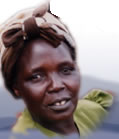 |
 |
||
 |
|||
|
RELATED THEMES education gender population social change social relationships OTHER LOCAL THEMES BACKGROUND |
family life
Perhaps because of the Christian Church's open disapproval of this practice, several narrators take care to emphasise the rational reasons for adopting polygamy. One narrator clearly states: "Polygamy is not normally practised because somebody would like have the prestige of having many women. People tend to go for second wives because of responsibilities." And he goes on to explain how much easier it was to manage a family's various economic assets, such as land and cattle, in this way. "For example, if a Sabaot has land here and has another piece of land in Transzoia, it becomes difficult to manage effectively the two farms unless a more responsible person whom you trust - and I do not think there is any other person a man can trust other than another woman whom he has opted to marry - can be held responsible for the management of the land." (Kenya 19) Nevertheless another man claims that "to gain recognition in the community one needed to be polygamous. Polygamy enhanced your status...and it also symbolised that you were a wealthy man....The people who were monogamous were ridiculed as being single eyed and would not actually have a say in front of polygamous men" (Kenya 15) . And another claims that polygamy has been almost a political device, to "enlarge our numbers by all means" in the face of the rising threat from the Bukusu. As polygamy becomes less widespread, family structures have become more nuclear. Traditionally, a girl's marriage would be arranged by her parents and her future in-laws and once the dowry was agreed upon, she would go to live in her husband's clan. As one narrator says: "...in the past, there was a lot of co-operation....a wife belonged to a clan so she could get assistance from many sources....There was more family ties than now. Presently, a family comprises of a father, mother and the children" (Kenya 16) . While some women may feel they lack the old support systems, this narrator comments that it means less interference from in-laws and more autonomy for wives, for many a welcome change. Although boys were more valued than girls because they are the ones who pass on the family name, girls could bring wealth to her family. Bridewealth was traditionally paid in cattle (usually about three cows). Several narrators complain that dowry payments have increased today, and sometimes money is asked for as well as the cattle, because as more girls are educated, parents want to be compensated for the cost of the school fees. Because of the rising expense, dowry is not always paid, and this has resulted in many court battles. Also, young people are increasingly eloping and marrying without their parents' consent and with no exchange of dowry. Indeed, concern about an increasing lack of control over the young is voiced by several narrators, who link it with the decline in the community's role in educating and disciplining children. In the past, any member of the community could discipline a child, whereas now it is solely the parents' role, and sometimes the teachers' responsibility. Some feel this has led to a deterioration in the relationship between the older and younger generations. The latter also feel there has been a worrying increase in premarital sex, which they see as symptomatic of the general "moral decline" of the young. Attitudes to sex, and to unmarried mothers and their partners, are explored in some detail, revealing that virginity is held in very high esteem by the community, and single motherhood is seen as shameful. One narrator feels that education discourages women from marrying early and so they end up "morally loose", and it is because of this there are so many sexually transmitted diseases around. quotes about family life"The community.encouraged ladies to get married early, between 16-20 years, because it was believed that they would get "spoiled" if they continued to stay in the custody of their parents. But today things have changed so much, and the youth...have scant respect for elders....you will find young men purporting to marry ladies the age of their mothers." "Actually it is not that polygamy is bad, it is only that it has more challenges, and is more difficult to manage than a monogamous family." "Those thinking that payment of bride price is buying a woman are very wrong. In our community bride price is simply given as a token of appreciation to the parents who bore and brought up the girl, you are now taking as your wife.Bride price also cements the new relationship that is now brought in by marriage. It strengthens the relationship and gives it recognition in the community.This is the practice that is still respected very much in the community and it is going to be with us for a very long time." "In the past, [the seclusion period] was the time to learn what a man/woman should know. According to the traditions, boys are taught [how] to behave when they are married. Girls are taught in seclusion how they will cook, how to behave as a mother, how to feed their husbands and children and how to relate to their neighbours. This period is mainly for educating on how to live and feed the children. One is taught to leave childish behaviour and adopt adult behaviour." "...most of the men today have been influenced by the Christian religion, which discourages polygamy, and this explains why many men are only marrying a single wife today." "A child has no respect for his father and mother. That is what is spoiling this nation these days. " "[Polygamy] symbolised status, therefore I do not think there was any woman who did not wish to be associated with status." |
|
 Changes in marriage customs and family structure are the main aspects of this topic. The decline of polygamy is much discussed and is attributed to several factors. One narrator says:
Changes in marriage customs and family structure are the main aspects of this topic. The decline of polygamy is much discussed and is attributed to several factors. One narrator says: